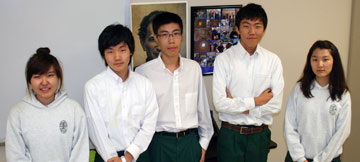
 It takes a certain amount of courage to leave everyone and everything you know and travel to another country for a year. Especially when the person in question is a teenager.
It takes a certain amount of courage to leave everyone and everything you know and travel to another country for a year. Especially when the person in question is a teenager.
But every year, 1,000s of students participate in foreign exchange programs, journeying to places where everything is strange. Where the students come from and how long they stay depends on which program the schools use — some are for a single semester, while others attend the whole year.
Two diocesan high schools — Bishop England in Charleston and Cardinal Newman in Columbia — use yearlong programs where students start in ninth or 10th grade and can return each year until they graduate.
“We really get to know the kids well,” said Kit Brownell, director of admissions at Bishop England. “It’s been great having them here on campus just because of what they bring to our school environment.”
She said it exposes American teens to a different culture and they realize that “teens are very much the same around the  globe.” They also learn tolerance so that differences are not an issue.
globe.” They also learn tolerance so that differences are not an issue.
Theresa Harper, admissions director at Cardinal Newman, said the youth stay with host families and become part of the community.
This year, Bishop England has seven students and Cardinal Newman has five, all from China, Korea or Mexico.
JunHyun “Kyle” Yoon, from Bishop England, said there are many perks to the program, but it can be hard.
Here’s what some of the students had to say about their experience:
JunHyun “Kyle” Yoon, South Korea
Even though it means being away from his family, JunHyun said he believes experiencing and learning about cultures around the world is an invaluable lesson. He has also studied in Canada and Singapore, which helped him mature spiritually and become independent.
Studying abroad will help him achieve his dream of becoming a diplomat, he said.
Differences: “Playing sports after school, instruments in orchestra, and being involved in a variety of clubs are things that Korean teenagers can never imagine,” JunHyun said.
In Korea, education is the most important obligation for teenagers, he said. They go to school until 4 p.m., then attend extra study sessions until almost 11 p.m., and after that, go to Hakwon tutoring institute or receive private tutoring.
When asked when they sleep, JunHyun repeated a well-known maxim among Korean students that warns: “You can dream while you are sleeping. But you can achieve your dream when you study.”
“Many Korean high school students are willing to give up their sleeping hours to study for their dream,” he said.
Favorite things: The teen said he loves it that American youth are encouraged to pursue their personal interests, noting that community service and extra-curricular activities enrich a teenager’s life and broaden their perspective.
In Korea, JunHyun had to give up his favorite interest of playing violin and focus solely on studying. But at Bishop England, a flexible school schedule and opportunities for extra-curricular activities revived his interest and passion for music.
With a lot of support, the teen re-established the Chamber Orchestra Club for the first time since 1945, and the musicians performed recently at a local church.
Difficulties: JunHyun said cultural differences in food, tradition and language are minor compared to the permanent yearning for home.
“One thing that I could never get rid of is the longing for my friends, family, and homeland,” he said.
Jeong In “Jane” Shin, South Korea:
The senior at Bishop England said she wanted to study abroad so she could major in computer science.
Once here, she was surprised that there were few cultural differences between teenagers from the two countries.
“They both hang out in similar ways, and even games and jokes are similar,” she said.
“Sometimes when I do stupid jokes, I think it is funny that they even have the same response, which is, ‘You are weird.’ It’s really hard for me to find the differences because I see them all as individuals,” she continued.
Likes: As with many Americans, Jane said she has fallen in love with all the fast foods and desserts.
“I know they are not good for health, but they taste so good,” she said.
The teen also enjoys the variety of sports, the opportunity for everyone to play, and the enthusiastic fans.
People are another joy for the student.
“Because I am from a foreign country, people ask me many questions and are nice to me,” she said. “I love [talking to] people who have an interest in my country.”
Hardships: Jane said she can’t get used to the overwhelming number of tests in American schools, or the way questions are phrased.
“I only need to take four tests in a year in South Korea,” she explained.
It’s also been hard to acclimate to the vastness of American communities.
“I don’t like that people live far away from each other,” Jane said. “Wherever I want to go, I need a car. I can’t meet people easily because they live too far away.”
Joon Ha Park, South Korea
Joon Ha is a sophomore at Cardinal Newman.
He said he wanted to make good friends and have a positive cultural experience abroad.
One of the differences the teen has noted is that “the kids here are nicer and more outgoing than at home.”
Joon Ha said art class and sports are among his favorite things in America.
